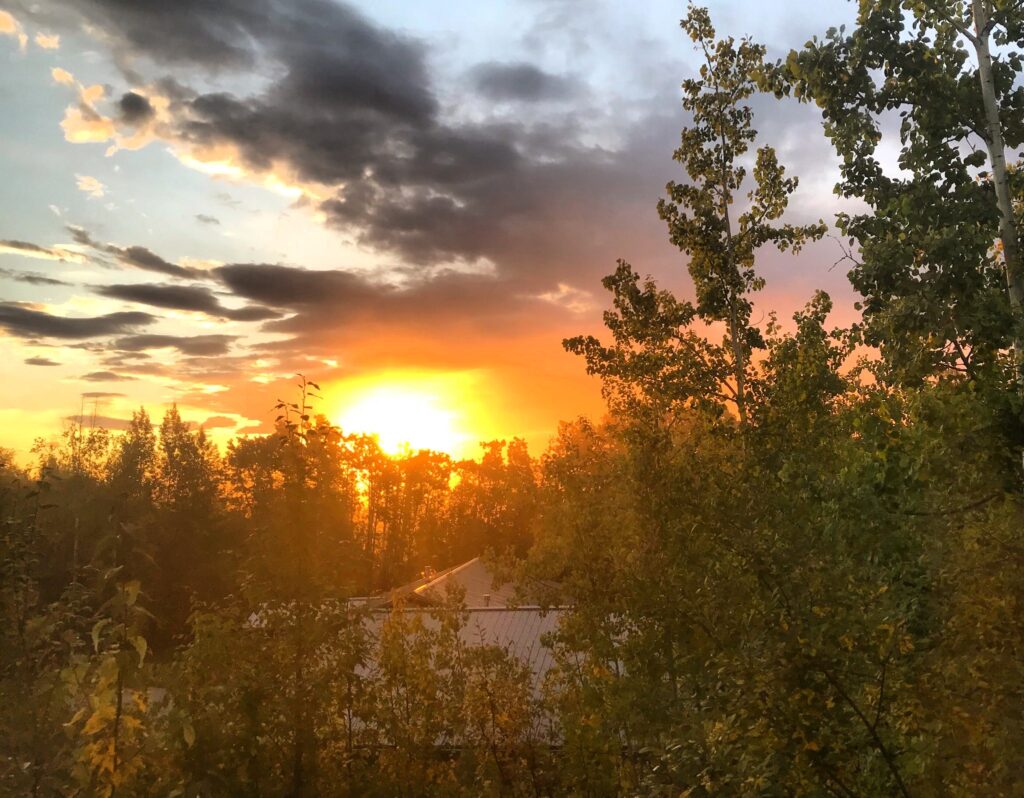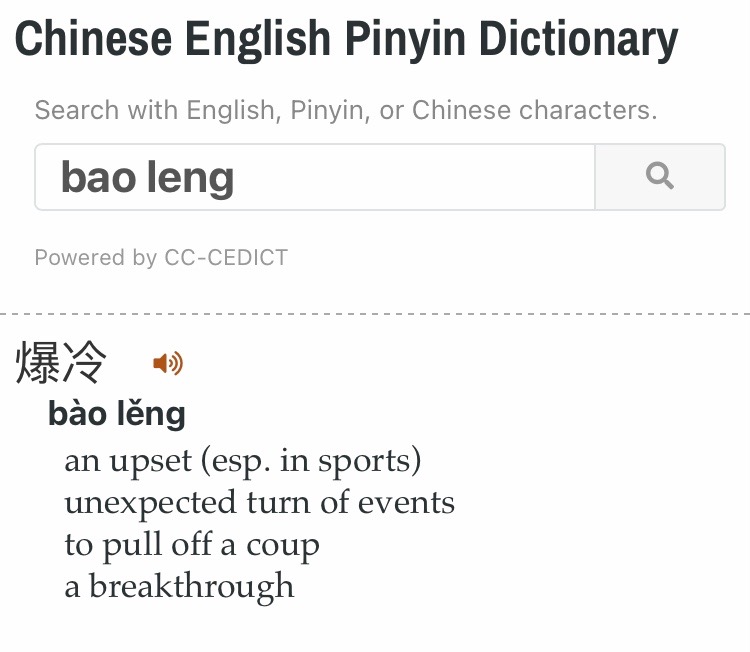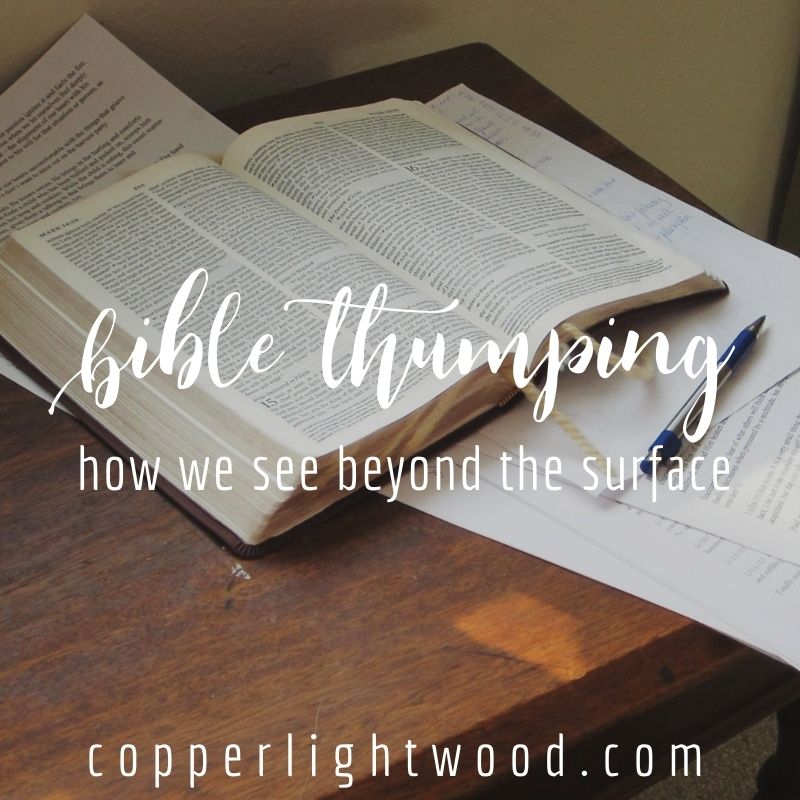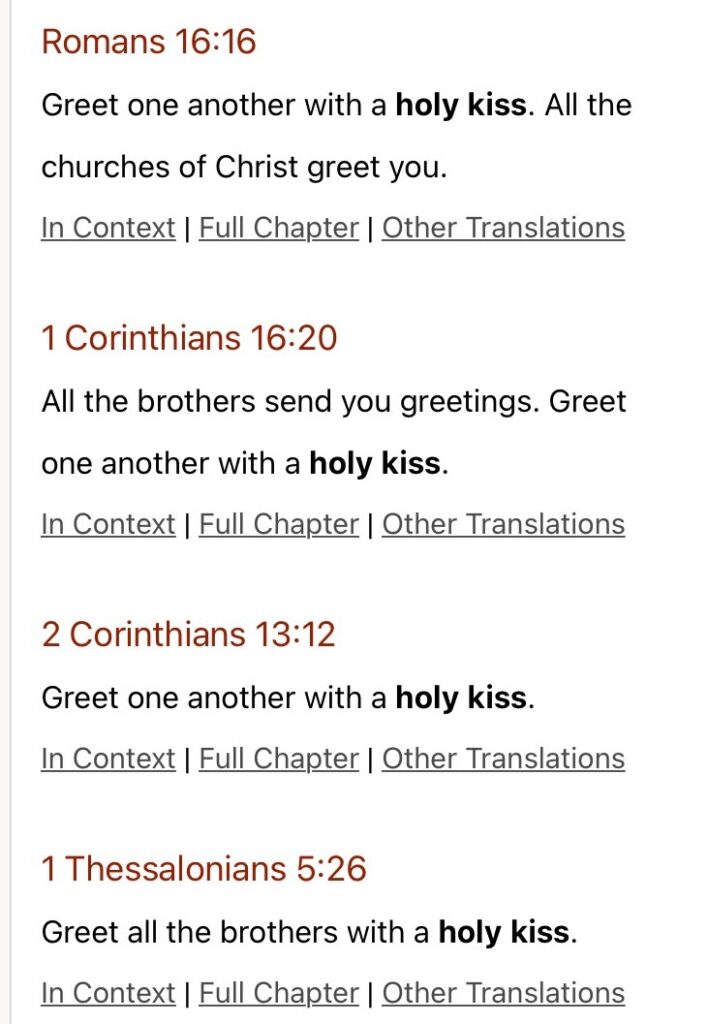I was buying books and Vin asked me to look one up that he’s wanted for a while.
“They have it in paperback or hardback, which do you want?” I asked.
“Paperback,” he said. “It might suck.”
And that’s wisdom, my friends.

This was a tough year reading-wise for me. Not because I didn’t read much – I read almost fifty books – but because I quit at least five other books in disgust after anywhere from fifty to several hundred pages (I mention one of them here). Fortunately, it was also a year full of books that are tried and true, old favorites that I happened to be reading again, and they made up for it.
Reading good books is like gentle, gradual irrigation of the mind. Reading the Bible is more like a power washer, or a rushing river. But all good books dislodge rocks and embedded lies from us, and reveal truths that never change but somehow can always come alive in a fresh way. Good reading is both cleansing and nurturing; it grows within us the stuff that preserves from rottenness and brings flavor. It changes our landscape, deep and wide. We recognize things about ourselves and the world around us, and we see things articulated that we didn’t have words for before.
Good books rile up justice and goodness, and bad books make excuses for it.
Here are my favorites from last year that (mostly) do all the right stuff. I hope you find a few that become your favorites, too.
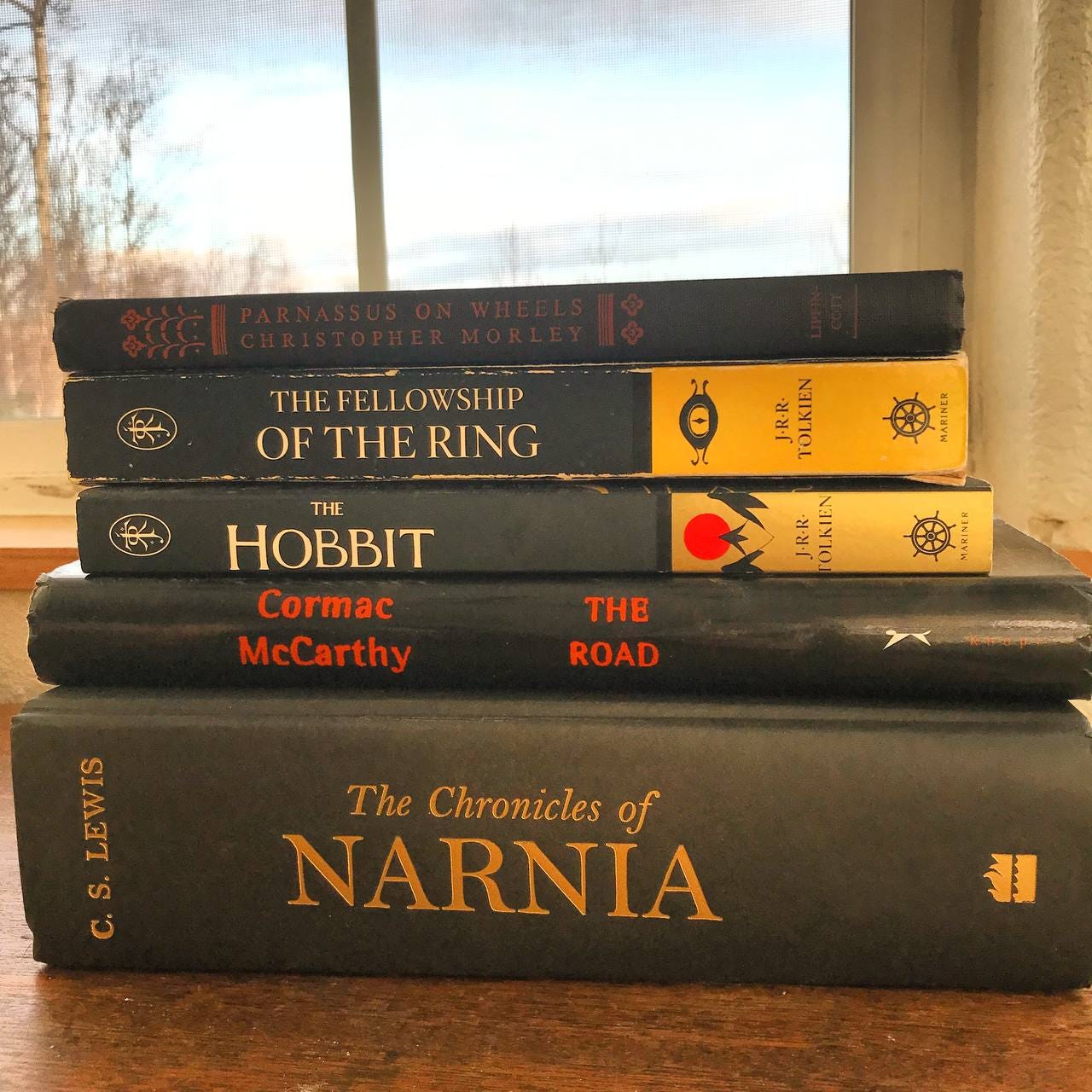
The Hobbit by J.R.R. Tolkien
“There seemed small need for watching in the days of our prosperity, and the guards were made over comfortable, perhaps — otherwise we might have had longer warning of the coming of the dragon, and things might have been different.”
Here is a case for rereading a classic that you didn’t care so much for the first time. (See also The Wind in the Willows.) I’ve read this twice before and it was okay, nothing that excited me too much. And then I read it again last spring with my daughter and our Gaining Ground group, and lo and behold…things came alive that I missed the first (and second) times around. I’m convinced now, it’s a keeper – and it makes the extremely Hobbity and slightly silly first chapter of Fellowship of the Rings (see below) make a lot more sense now. It is a fairy-tale-like children’s book full of trolls, spiders, thieving, sneaking, jealousy, fighting, shapeshifting, invisibility, riddles, and battles…but yeah, it really is a good book with solid values worth sharing with your kids. Or your spouse. Or your cat.
The Chronicles of Narnia by C.S. Lewis
Hey, this one counts as seven – or actually six, because we just started the last book in the series again a few nights ago, but we read the other six out loud at dinner time to the kids throughout 2022.
If you have never read these, or you haven’t read them in years, or you only read The Lion, the Witch, and the Wardrobe, or you only saw the movies (egad), you should find the nearest 4- to 18-year-old and start reading this with them, post-haste. You don’t need to read them in order (chronologically or in the order they were written, and yes, those are different) but I’m still noticing details in certain stories that allude to characters or events in the other ones that I never noticed before. Every single book in the Narnia series has truths in it that are articulated brilliantly and beautifully, and they will change your life and our culture for the better.
How an Economy Grows and Why it Crashes by Peter Schiff
Make economics fun again! If you need an easy refresher on basic economics or a great book for your middle/high schooler, this book illustrates the principles through a fictional land of islanders who begin their own economy through trading fish and services, on just one fish a day. It explains principles without jargon and shows how they are both used and abused. And if you know your U.S. history, you’ll enjoy a lot of the snarky humor that identifies some of those abusers, as well.
A Christmas Carol by Charles Dickens
“The curtains of his bed were drawn aside; and Scrooge, starting up into a half-recumbent attitude, found himself face to face with the unearthly visitor who drew them: as close to it as I am to you, and I am standing in the spirit at you elbow.”
My first encounter with this book was in the 8th grade when our English teacher read it aloud to us the week before Christmas break. I remember very little (as in, nothing) of it, which, combined with what I already told you about The Hobbit and Wind in the Willows, is an indictment on either the Anchorage public school system or my attention span. Probably both.
But now! Ohmygosh, I love this book so much. This is the second time we’ve read it aloud as a family, and even our little guys – ages 4 and 7 – liked it. (Giving characters different voices helps.) You don’t have to read this at Christmas; it is beautiful year round, and if you want an easy way to dip your toes into Dickens’ works, this is the one to start with. (Oliver Twist is probably a good second.)
Polyface Micro by Joel Salatin
This is a good book to read if a) your life has been taken over by poultry, b) you are aware of the crisis in our food system and know the egg shortage we’re seeing is only the tip of the iceberg, or c) you want to take your dreams of homesteading and start doing something about them. This is livestock farming micro-style, for those of us with yards instead of fields. Lots of ideas here on how to do the basics, plus plenty of insight and hacks that only come from someone with years and years of experience who is willing to tell you about his mistakes so you don’t have to repeat them.
The Road by Cormac McCarthy
This one threw me for a loop at first. There’s a lot of dialogue but no quotation marks, an intentional lack of apostrophes in many contractions, and you quickly discover that rules can be broken if you write and tell a story as well as this guy. Every once in a while I came across a word I suspected he was making up, but then I’d check, and by golly, he pulls vocabulary up from the very bones of the earth and puts those words to work again.
It’s not a kids’ book but I’d recommend it to mature high schoolers. The story is intense and fascinating, about a father and son traveling through a post-apocalyptic wasteland just trying to survive. I read it in two days and then immediately put it on Vince’s stack and demanded he read it, too – which he did, and he also loved it.
The Gift of Fear by Gavin de Becker
File this one under “Information everyone needs to know and hopes they never have to apply” – which I guess you could also say for any book on farming. (Ha ha, I jest…sorta). Not a great book, but an important book about crime, human nature, and protecting yourself from whackos. Eat the meat, spit out the bones; it’s a three-star book with lots of five-star info.
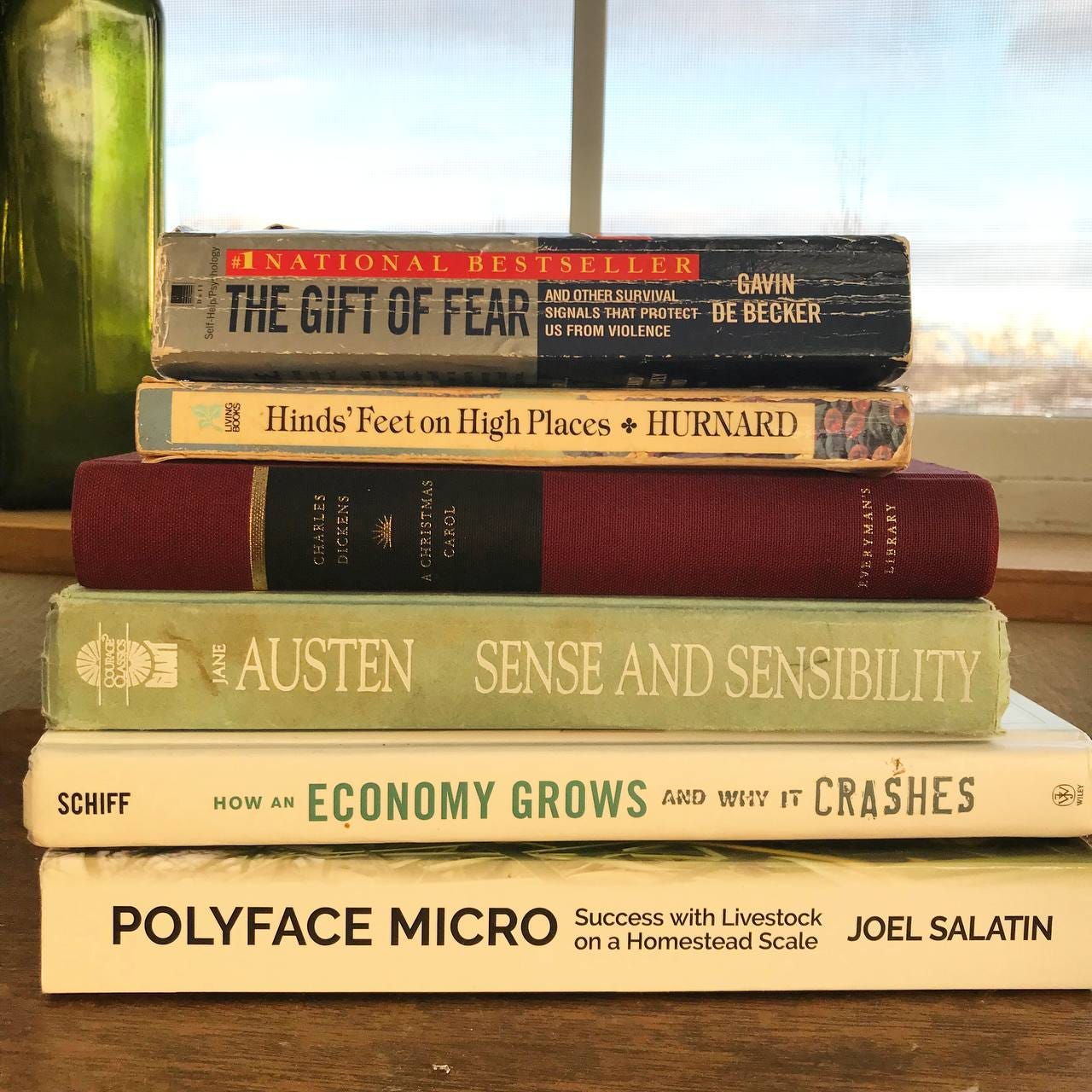
Hinds Feet on High Places by Hannah Hurnard
If you are grieving or walking through a hard season, this book is a great companion. Much Afraid is a girl who has been threatened, gaslighted, and mistreated, and the Shepherd leads her on a journey that isn’t just escape, but destiny – she learns her true identity through a process of obedience, faith, and surrender. We read this in Gaining Ground last summer, and so many of us found great healing, encouragement, and revelation for different situations we were navigating.
Parnassus on Wheels by Christopher Morley
A woman buys a book wagon and takes off across the countryside in the early 1900s, leaving her slightly selfish brother in the lurch and baffled at her gumption. A funny and fast book about books, and reading, and love, and surprises.
Sense and Sensibility by Jane Austen
“By reading only six hours a day, I shall gain in the course of a twelvemonth a great deal of instruction which I now feel myself to want.”
Why use a boring word like “year” when you can say twelvemonth? This story is about two sisters: Elinor is all things tact, courtesy, and self-control, and Marianne is all things honest, transparent, and idealistic. By the end of the book they are both stronger, wiser, and happier, and the reader is, too.
The Fellowship of the Ring by J.R.R. Tolkien
“It seemed that the evil power in Mirkwood had been driven out…only to reappear in greater strength in the old strongholds….the power was spreading far and wide, and away far east and south there were wars and growing fear….Little of all this, of course, reached the ears of ordinary hobbits. But even the deafest and most stay-at-home began to hear queer tales; and those whose business took them to the borders saw strange things.”
There’s a great evil in the world that has been hidden for ages, lurking unknown, unsuspected by those who are happily oblivious until some strange, seemingly unrelated occurrences start happening with increasing frequency. Once discovered, the evil must be completely destroyed before everything good in the world is destroyed first.
Sounds eerily familiar, yes? But no, it’s not the Deep State; it’s Sauron, the Lord of the Rings. I’ve read this at least five times but am finding parallels and wisdom for our current days that I’ve never seen before. Fellowship is the first part of The Lord of the Rings, which is really just one ginormous book of over a thousand pages, often separated into a trilogy. We’re currently tackling it in Gaining Ground and just started The Two Towers, the middle book. If you have tried Fellowship before and couldn’t get past the odd, folksy first chapter, please give it another shot. By chapter two it changes rapidly from a children’s book like The Hobbit into the life-changing and dramatic saga of good versus evil so many of us love.
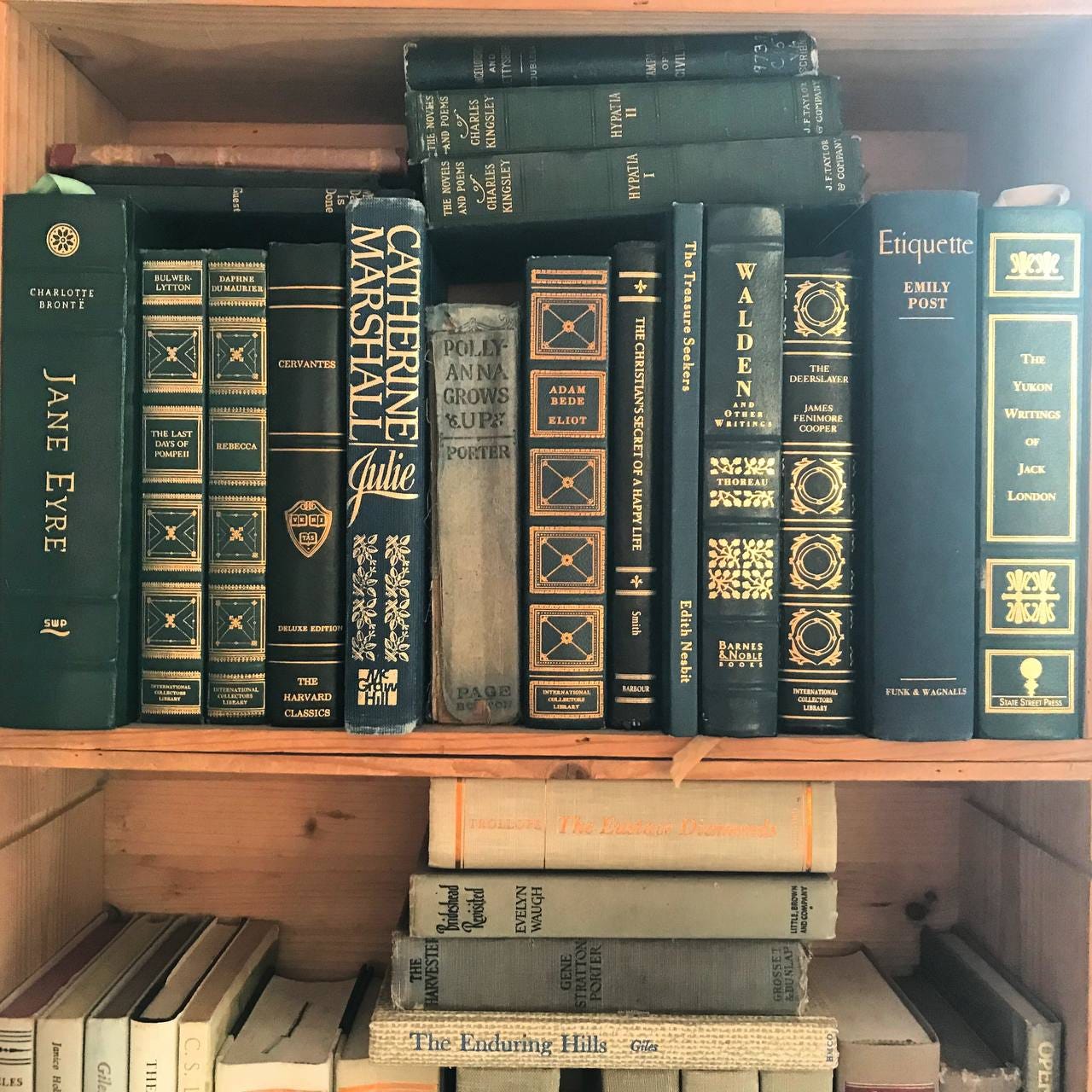
Wait, you keep talking about Gaining Ground. What is that?
It’s our online book club on Telegram. It originally started a few years ago as a book club that incorporated writing coaching, but I’ve stopped coaching and now we just read and chat about books and share nerdy, bookish memes. Our group ebbs and flows every time we start a new book, but it’s grown to over a hundred people and you can join us here if you’d like.
My goal this year is more books, less videos; more pages, less screen time. More time together, more shared stories, more ideas, more joy, more justice. Less fabricated news, more newsworthy knowledge. More wholeness, goodness, and truth, with a side of coffee or tea. Probably a cat or two. Maybe a blanket. Plus a 30% chance of a huge bowl of popcorn, which I may or may not share.
P.S. Want more book recommendations? Here’s my list from last year. Reading great books is one of the easiest ways to transform our culture.


